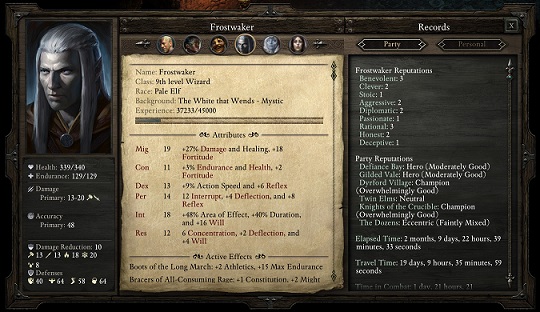(No real spoilers here.)
As noted earlier, Pillars of Eternity boasts quite the complex reputation system. Reputation with different factions, some of which oppose each other – done that. Beyond that, however, there are ten special reputation attributes which reflect your character’s, well, character: From honest to deceptive, from aggressive to diplomatic, there are a lot of options:
Faction reputation is managed just as everywhere else – you solve quests in which you prefer one of the competing factions to the other. In addition, Pillars tracks your behavior towards faction members on a smaller scale, but the quests really contribute the bulk here.
With the character reputation, it’s not so easy – points accumulate over time, from just about every conversation, and do so very slowly. This also means that you can’t just save the game before a key event and later on completely change the course by altering your decision in this event.
An amusing result of this is that even pseudo decisions can have an effect. You know the drill – there’s a conversation, you apparently have four ways to answer, but actually each of them leads to the same next conversation node. Well, in Pillars, there might still be a difference, because even though the other one might go on with his story no matter what option you choose, there’s still a difference in attitude between “Please go on, your story is heartbreaking” and “Is this going to take long? My left ear is already bored to death”. So there’s no immediate impact of your choice here, but in the long run, you might find that people are more likely to tell you stories if you do not ridicule them. Then again, to others, this might appear as weakness: The developers explicitly state that none of the characteristics are simply beneficial. “Honest” might also be perceived as “naive”, and so on.
In my own playthrough, I was at first developing a reputation of being both honest and aggressive (this changed later on, as may be gathered from the screenshot). This led to an interesting encounter with a bunch of would-be assassins: I was able to intimidate them (“You know what I’m doing with my victims?”) and could convince them that my threats are for real (“You know I keep my word”). Most of the gang dropped their weapons and fled, and their leader I could take into the dungeon of my own stronghold. Sadly, I thought I could extract information from her there, but all I could do was hold her for ransom.
So you now might be tempted to save work in your dialogue construction by including lots of pseudo choices since they still have an effect now. Well, I have this feeling it will balance out in the end, since what you take away here, you will have to add otherwise, namely when you have to add consequences of this behavior to later dialogues. This “consequences” part is much easier to manage within the faction reputation system; you get tangible rewards, better equipment, a higher standing within the faction, access to secret knowledge and so on, all of which is pretty difficult to do with character reputation (“oh, now you are aggressive enough to learn the Fireball spell”). And if you also wish to have stats, skills and faction reputation have an influence on dialogues, you’ll find your conversations overloaded pretty soon. Therefore, even though character reputation looks like something interesting to do, I’d rather treat it as the cherry on the cake. This is evidenced by the fact that even in Pillars itself, game-changing reactions like in the assassin ambush are quite rare and overall, don’t make much of a difference. In possible successors, I’d like to see more of it, because the system itself is quite well thought-out and makes you think about your answers even in less important talkings.
Oh, and of course it’s a prime example of bringing an RPG classic (reputation) into the modern world (by merging it with the ubiquitous “moral decisions”)…

